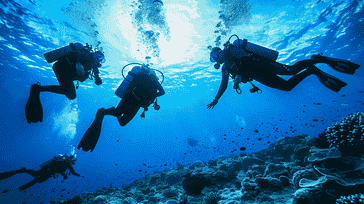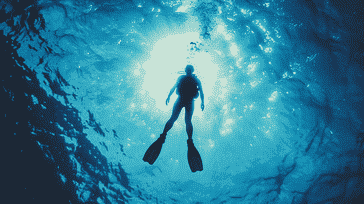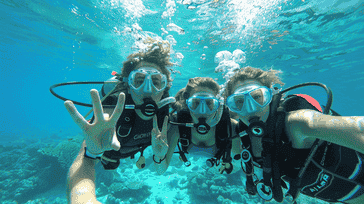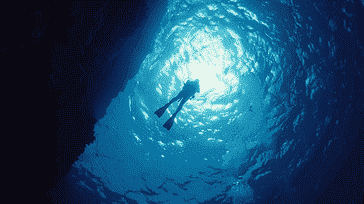

In the world of extreme sports, scuba diving stands out as a thrilling adventure that combines adrenaline and underwater exploration. Whether you are a seasoned scuba diver or someone looking to take the plunge for the first time, the choice between solo and group dives can greatly impact your experience. In this article, we will delve into the exhilarating world of diving and extreme sports, exploring the advantages and considerations of both solo and group underwater adventures. So, whether you seek the solitude of diving alone or the camaraderie of diving with others, let us guide you towards finding the perfect dive experience.
Diving and extreme sports offer adrenaline-pumping experiences for thrill-seekers. Immerse yourself in the captivating world of diving, where you can explore the depths of the ocean and push your limits to new heights. Feel the rush of adrenaline as you embark on extreme diving adventures that combine the thrill of sports with the awe-inspiring wonder of deep-sea exploration.
When it comes to seeking an extraordinary adrenaline rush, few experiences compare to diving and extreme sports. These thrilling activities provide a unique blend of adventure, excitement, and the opportunity to conquer new challenges. Whether you're a fan of scuba diving, cliff diving, or free diving, the underwater world holds endless possibilities for those who are brave enough to take the plunge.
"Diving is like entering a whole new universe—where gravity disappears, and you're enveloped in an ethereal silence," says Sarah Thompson, an avid diver and extreme sports enthusiast. "The combination of adrenaline and the breathtaking views below the surface is truly unparalleled."
Adrenaline junkies are drawn to the rush of diving and extreme sports, driven by the desire to push themselves beyond their comfort zones. The sense of exhilaration that comes from exploring the unknown and embarking on daring underwater adventures is unmatched. Whether you're exploring vibrant coral reefs, navigating underwater caves, or encountering majestic marine life, each dive brings a unique and thrilling experience.
Diving and extreme sports provide an unparalleled fusion of thrill and wonder. The adrenaline rush of extreme sports, such as skydiving or rock climbing, meets the captivating beauty of the underwater world in scuba diving, creating an extraordinary combination of sensations. The breathtaking landscapes and awe-inspiring marine life encountered during dives create moments of pure magic, leaving divers with unforgettable memories.
If you're craving an adrenaline rush like no other, diving and extreme sports are sure to satisfy your adventurous spirit. So, strap on your scuba gear, prepare to plunge into the deep, and embrace the amazing experiences that await you below the surface.

When it comes to diving, you have the option to go solo or join a group. Both options have their own advantages and considerations. Let's explore the pros and cons of each to help you make an informed decision based on your preferences and objectives.
Solo diving allows you to embark on underwater adventures at your own pace. You have the freedom to choose dive sites and explore the depths according to your interests. The solitude of solo diving can also provide a profound sense of tranquility and a closer connection with the underwater world.
With solo diving, it's just you and the ocean, creating a truly personal and intimate experience. It's an opportunity to dive into your own thoughts and immerse yourself in the beauty of underwater landscapes.
However, solo diving comes with additional responsibilities. You must have advanced diving skills and be confident in your ability to handle any situation that may arise. It's important to meticulously plan your dives, monitor your own equipment, and be self-reliant. Safety should always be a top priority when diving alone.
Joining a group for diving adventures offers a completely different experience. It allows you to share the excitement and joy of underwater exploration with like-minded individuals. Group dives often foster camaraderie and the opportunity to make new friends who share your passion for the underwater world.
Diving in a group also enhances safety as you can rely on your dive buddies for support and assistance. Together, you can navigate challenging conditions, spot marine life, and create lasting memories.
In addition, group dives often provide access to a wider range of dive sites and activities. Dive centers and operators can organize group trips to remote locations, ensuring you get to explore the most breathtaking underwater environments alongside experienced guides.
Deciding between solo and group dives ultimately depends on your preferences, comfort level, and goals. If you cherish solitude and the ability to control your diving experience, solo diving may be the ideal choice. On the other hand, if you enjoy socializing, sharing experiences, and benefit from the reassurance of diving with others, group dives can offer a fulfilling and enjoyable adventure.
Remember, whether you opt for solo or group diving, always prioritize safety and adhere to the necessary guidelines and certifications. Now that you have a better understanding of the pros and cons, you can make an informed decision that will lead you to unforgettable underwater adventures.
Experience the thrill of solo diving, where you can immerse yourself in the wonders of the underwater world at your own pace. Solo diving offers a unique opportunity for solitude and self-reliance, allowing you to embark on thrilling underwater adventures on your terms.
When you choose to dive solo, you have the freedom to set your own schedule and explore the depths of the ocean without any restrictions. No longer bound by the pace or preferences of a group, you can truly delve into the underwater realm and discover hidden treasures that await.
One of the greatest attractions of solo diving is the solitude it offers. It allows you to disconnect from the outside world, immerse yourself in nature, and find inner peace as you navigate through the mesmerizing underwater landscapes. Experience a sense of tranquility as you take in the beauty of colorful coral reefs or encounter fascinating marine life in their natural habitat.
Moreover, solo diving provides an opportunity for self-discovery. It enables you to push your limits, build confidence, and develop a deeper understanding of your own capabilities. As you navigate through the underwater currents and overcome any challenges, you'll develop a sense of empowerment that carries over into other aspects of your life.
When embarking on a solo diving adventure, it is essential to equip yourself with the right tools and skills to ensure a safe and rewarding experience. Here are some of the key considerations:
"Diving is both a physical and mental experience. Be prepared, stay focused, and trust your training."
Here are some tips to enhance your safety and enjoyment during solo diving:
By following these tips and staying mindful of your surroundings, solo diving can provide you with unforgettable underwater adventures and a deep sense of personal fulfillment.
| Pros of Solo Diving | Cons of Solo Diving |
|---|---|
| Freedom to set your own pace and explore at your leisure. | Lack of immediate assistance in case of emergencies. |
| Ability to choose your preferred diving spots. | Possible feelings of isolation and loneliness. |
| Increased self-reliance and personal growth. | Additional responsibilities and risks. |

Group diving is a fantastic way to connect with other passionate individuals who share your love for underwater adventures. It offers a unique opportunity to forge new friendships, create lasting memories, and explore the depths of the ocean together.
When you embark on a group diving experience, you open yourself up to the joys of social interaction. You'll have the chance to meet like-minded divers from diverse backgrounds, exchanging stories and learning from one another. Whether you're a seasoned diver or just starting out, the camaraderie and support within the group will make your underwater adventure even more enjoyable.
Shared experiences are a hallmark of group diving. As you explore the majestic underwater world, you'll have the opportunity to witness breathtaking marine life, discover hidden treasures, and encounter unique underwater ecosystems. These shared moments create a bond among divers, fostering a sense of belonging and connection that can be truly transformative.
Group diving allows you to experience the wonders of the ocean while surrounded by a supportive community of fellow adventurers. It's an opportunity to dive into extraordinary underwater landscapes, share in the thrill of exploration, and create cherished memories that will last a lifetime.
In addition to the social and emotional benefits, there are practical advantages to group diving as well. Diving as a team provides an added layer of security and reassurance. You can rely on your fellow divers for assistance, guidance, and safety checks, enhancing the overall diving experience. The collective knowledge and expertise of the group can also lead to new discoveries and insights, enriching your understanding of the underwater world.
So, if you're looking for a diving experience that combines adventure, companionship, and shared exploration, group diving is the perfect choice. Join a group of fellow diving enthusiasts, immerse yourself in the beauty of the underwater realm, and create lifelong connections that go beyond the depths of the ocean.
Whether you're embarking on a solo dive or joining a group underwater adventure, having the right diving gear and equipment is essential for a safe and enjoyable experience. From masks to wetsuits, each piece of equipment plays a crucial role in ensuring your comfort, protection, and ability to explore the depths effortlessly.
Here are the must-have items of diving gear and equipment for any underwater adventure:
While diving gear and equipment are essential, remember to prioritize safety at all times. Here are some important safety considerations to keep in mind:
By investing in quality diving gear and equipment and prioritizing safety, you can enjoy underwater adventures knowing you're well-prepared and protected. Remember to regularly update and upgrade your gear as needed and stay informed about the latest safety protocols to ensure a memorable and incident-free diving experience.
| Diving Gear | Features |
|---|---|
| Diving Mask | Allows for clear vision and pressure equalization |
| Fins | Provides propulsion for effortless underwater movement |
| Wetsuit | Protects against colder waters and potential scrapes or stings |
| BCD (Buoyancy Compensator Device) | Enables buoyancy control and ease of movement |
| Regulator | Delivers air for breathing underwater |
| Dive computer | Keeps track of depth, time, and decompression limits |
| Weight system | Maintains neutral buoyancy |
| Dive light | Enhances visibility in darker environments |

For extreme sports enthusiasts, diving offers a unique blend of adventure and exploration. It's a thrilling experience that satisfies the cravings of those seeking adrenaline-fueled activities. Whether you're an experienced diver or new to the world of extreme sports, diving offers an unparalleled opportunity to push your limits and discover the wonders of the underwater world.
What sets diving apart from other extreme sports is the sense of freedom it provides. As you descend into the depths, surrounded by the vastness of the ocean, you'll feel a rush like no other. The excitement of exploring uncharted territories and encountering mesmerizing marine life creates an experience that is both awe-inspiring and exhilarating.
Extreme sports enthusiasts are driven by the need for new challenges and unique experiences. Diving delivers on both fronts. Whether you're diving in coral reefs teeming with vibrant marine ecosystems or exploring mysterious underwater caves, each dive presents its own set of challenges and rewards. It's an opportunity to conquer fear, overcome obstacles, and push your physical and mental boundaries.
"Diving is like no other sport. It combines the thrill of exploration with the beauty of the underwater world. It's a perfect fit for extreme sports enthusiasts who crave adventure and adrenaline." - John Smith, experienced diver
Moreover, diving allows you to connect with like-minded individuals who share your passion. Joining a dive trip or becoming part of a diving community not only provides the opportunity to dive with others but also fosters a sense of camaraderie and shared experiences. The bonds formed through diving can last a lifetime and create a network of fellow thrill-seekers who truly understand the excitement and fulfillment that diving brings.
Another aspect that makes diving an ideal choice for extreme sports enthusiasts is its accessibility. Unlike some other extreme sports that require specialized skills or equipment, diving can be enjoyed by individuals of different fitness levels and experience. With proper training, the underwater world becomes accessible to anyone with a love for adventure.
| Extreme Sport | Level of Adventure | Accessibility | Exploration Opportunities |
|---|---|---|---|
| Diving | High | Accessible to a wide range of individuals | Exploring uncharted underwater territories |
| Rock Climbing | High | Requires specialized training and equipment | Scaling towering cliffs and mountains |
| BASE Jumping | Extreme | Highly specialized and dangerous | Jumping off tall structures and cliffs |
| Free Soloing | Extreme | Requires advanced climbing skills | Scaling mountains without ropes or harnesses |
As seen in the table above, diving offers a level of adventure comparable to other extreme sports while remaining accessible to a wide range of individuals. It provides unprecedented opportunities for exploration and allows you to witness the breathtaking beauty of the underwater world.
So, if you're an extreme sports enthusiast looking for your next adrenaline-fueled activity, diving should be at the top of your list. Dive into the depths, discover a world beyond your imagination, and experience the thrill that only diving can offer.
Whether you are drawn to the allure of scuba diving or the excitement of extreme sports, the underwater world offers a myriad of thrilling adventures waiting to be explored. Whether you choose to dive solo or in a group, the choice is yours, but the possibilities for excitement and discovery are endless.
For diving enthusiasts, scuba diving provides an opportunity to dive deep into the depths of the ocean, immersing yourself in an awe-inspiring world teeming with vibrant marine life. The adrenaline rush experienced while exploring underwater caves or swimming alongside majestic creatures is unparalleled, making scuba diving one of the most exhilarating extreme sports out there.
On the other hand, if you prefer the camaraderie and shared experiences of group activities, group diving is the perfect choice for you. Diving with a group allows you to bond with fellow adventurers, exchanging stories and creating memories that will last a lifetime. Together, you can embark on thrilling underwater adventures, exploring hidden treasures and diving in uncharted territories.
So, whether you choose to dive solo or in a group, remember to equip yourself with the necessary diving gear and adhere to safety guidelines to ensure an unforgettable and safe underwater experience. Dive into the world of underwater adventures today and discover the magic that awaits beneath the surface.
Diving is a thrilling underwater activity that allows individuals to explore the depths of the ocean using specialized equipment and techniques. It is a popular extreme sport that combines the adrenaline rush of extreme sports with the wonder of deep-sea exploration.
Some extreme diving experiences include cave diving, wreck diving, and deep-sea diving. These activities offer unique challenges and allow divers to push their limits while exploring breathtaking underwater environments.
Yes, scuba diving is considered an extreme sport due to the inherent risks involved and the adrenaline rush it offers. It requires proper training, equipment, and experience to ensure a safe and enjoyable dive.
The essential diving gear and equipment include a diving mask, snorkel, fins, diving regulator, buoyancy control device (BCD), dive computer, wetsuit or drysuit, and a weight system. Additional gear may be required depending on the specific diving conditions and activities.
Yes, you can dive alone, but it requires proper training, experience, and certification as a solo diver. Solo diving offers a unique sense of solitude and self-reliance, but it also comes with increased risks. Always prioritize safety and consider diving with a buddy whenever possible.
Group diving allows for social interaction, shared experiences, and collective exploration. Diving with a group provides additional safety measures, as divers can watch out for each other and offer assistance if needed. It also offers the opportunity to learn from others and create lasting memories together.
The choice between solo and group dives depends on your preferences and objectives. Solo diving is ideal for those seeking solitude and self-paced exploration, while group diving offers camaraderie and shared experiences. Consider your comfort level, diving skills, and the type of adventure you seek to make an informed decision.
Safety is of utmost importance in diving. Some essential safety considerations include proper training and certification, maintaining equipment in good condition, monitoring dive times and depths, adhering to diving buddy systems, conducting pre-dive safety checks, and being aware of potential risks and emergency procedures.
Absolutely! Diving offers an exhilarating blend of adventure and exploration that appeals to extreme sports enthusiasts. The adrenaline rush of diving, combined with the excitement of discovering new underwater landscapes and encountering marine life, makes it a thrilling choice for those seeking adrenaline-fueled activities.
Copyright © 2024 Challenging XS. All rights by Challenging XS.